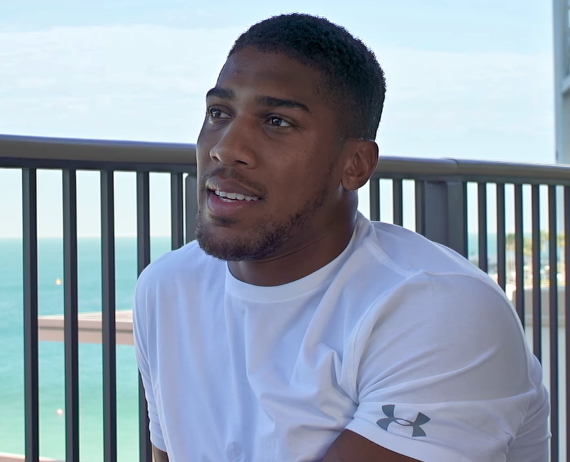Anthony Joshua reveals on BBC Radio 4 his desire for his son to avoid boxing and opt for accountancy, reflecting on his personal journey and career
British heavyweight boxing icon Anthony Joshua has made headlines beyond the ring by expressing his hopes that his son, Joseph Joshua (“JJ”), chooses a career path away from boxing. In an intimate interview on BBC Radio 4’s Desert Island Discs, Joshua shared his perspective on family, his tumultuous past, and his ambitions for his son’s future.
Joshua recounted his own turbulent youth in Watford, where he faced challenges including brushes with the law and homelessness. It was during this difficult period that Joshua discovered boxing, a sport he credits with providing him focus and direction. Introduced to boxing at the age of 18 by a cousin, Joshua quickly found success, culminating in a gold medal at the 2012 London Olympics. This victory catapulted him into professional boxing, where he eventually became a two-time former unified world heavyweight champion.
Embed from Getty ImagesDespite his achievements in the ring, Joshua has experienced setbacks, notably in 2022 when he was defeated by Oleksandr Usyk in Saudi Arabia, failing to reclaim his heavyweight title. The loss deeply affected Joshua, prompting a period of introspection where he grappled with the emotional aftermath and sought solace in his family.
Joshua’s interview with BBC Radio 4 delved into his role as a father and his aspirations for his son, JJ. He emphasized the importance of JJ forging his own path and avoiding the pitfalls associated with professional boxing. Joshua expressed a preference for JJ to pursue a career in accountancy, highlighting the value of understanding numbers and ensuring a stable future.
Beyond his personal life, Joshua’s career and public persona have been marked by a commitment to philanthropy and community service. He has been vocal about supporting retired boxers and plans to establish a care home for former athletes facing health challenges post-retirement.
Analysis:
Political: Anthony Joshua’s public stance on steering his son away from boxing can resonate politically in discussions about sports ethics and parental influence. It raises questions about the responsibilities of public figures in promoting safer career choices for youth and influencing policies that protect young athletes’ well-being.
Social: Joshua’s preference for JJ’s career reflects broader societal debates on parental guidance and career choices for children. It prompts discussions on the influence of parental professions on children’s aspirations and the societal pressures faced by children of public figures.
Racial: While not directly racial, Joshua’s journey as a black British athlete and his choices for his son may spark discussions on representation in sports and career diversity among minority communities. It highlights the importance of diverse role models and the challenges faced by athletes of colour in navigating professional sports careers.
Gender: Joshua’s perspective on his son’s career underscores gender norms and expectations, challenging stereotypes associated with masculinity in sports. It invites conversations on gender roles within families and the evolving definitions of success and fulfillment beyond traditional sporting achievements.
Economic: Joshua’s advocacy for accountancy over boxing for his son touches on economic considerations within sports careers. It raises awareness of financial stability and long-term planning in athletics, highlighting the economic pressures faced by athletes and the importance of financial literacy in sports education
